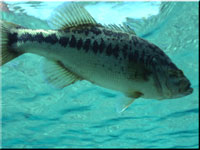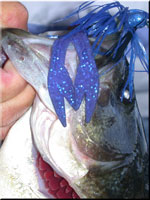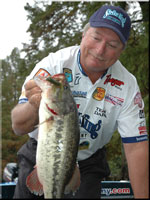Top Professional Bass Fishermen Say, We Fish to Win
Denny Brauer’s Gambling Attitude When He Fishes
 Editor's
Note: Why do some bass fishermen consistently win tournaments
and other good, even great, bass anglers never win tournaments?
To learn the answer to this question, I’ve interviewed
some of the most-outstanding bass fishermen in the nation,
and they all agree that to win an angler has to make
a conscious decision to fish to win and leave the security
of trying to catch a limit behind. Editor's
Note: Why do some bass fishermen consistently win tournaments
and other good, even great, bass anglers never win tournaments?
To learn the answer to this question, I’ve interviewed
some of the most-outstanding bass fishermen in the nation,
and they all agree that to win an angler has to make
a conscious decision to fish to win and leave the security
of trying to catch a limit behind.
"I never fish for second place," Denny Brauer
of Camdenton, Missouri, 1998 Bassmaster Classic winner,
says. "To win, you must have a gambler's mentality.
There's a conservative way to fish, and there's the
gambler’s way to fish. If you abandon the conservative
way to fish, which consistently produces points and
paychecks, and fish the tactics that don't seem to be
rational, if they work, you'll have the opportunity
to win.
“For instance, if you're in the last day of the
tournament and in first place, but you know the bass
you're catching aren't big enough to produce the win,
you have to be willing to abandon that pattern. Then
you have to go to a place on the lake – perhaps
one you've never fished before – and try a pattern
you've never used. If that tactic does work, you'll
probably win. But instead, most anglers will stay with
the bass they've been catching during a tournament and
take the conservative road, rather than gambling with
their chances to win."
Brauer admits that early in his career, he needed to
make a paycheck to continue his career as a professional
fisherman. He mainly fished conservatively and catch
however many fish he could catch to make a payday, allowing
him to go to the next tournament. He hoped to impress
potential sponsors by proving himself as a consistent
angler and wanted to earn enough points to qualify for the Bassmaster Classic.
However, as Brauer’s career progressed, he’d
risk ending the tournament in last place to try for
the win.
enough points to qualify for the Bassmaster Classic.
However, as Brauer’s career progressed, he’d
risk ending the tournament in last place to try for
the win.
"You only have so many chances to win, so why
squander those chances by being conservative?"
Brauer asks. "I’ve developed the attitude
that I'd rather finish last, miss being in the Bassmaster
Classic and go for the win rather than being conservative.”
Brauer confesses that developing his winning philosophy
occurred after he won the B.A.S.S. Angler-of-the-Year
title in 1987, an award for proven consistency. In 1985,
the first year Brauer attempted to win Angler of the
Year, he came in third place and then second in 1986.
"From 1985 to 1987, I tried to maximize every
opportunity to finish and get points for the Bassmaster
Classic," Brauer mentions. "I finally realized
that there were several tournaments I could have won,
if I’d had the courage to not be concerned about
winning the title, and instead tried for the win rather
than making sure I earned a paycheck and points. I had
to really fight with my own fishing philosophy to change
from fishing conservatively to fishing to win."
Brauer also learned that when he fished primarily for
the Angler-of-the-Year title, he might not earn as much
money during the year as the anglers who fished to win.
He decided that if he won a couple of tournaments, oftentimes,
he’d collect more money than he took when he won
the Angler-of-the-Year title.
" I
made a conscious decision to change from fishing conservatively
to win the Angler-of-the-Year title to taking every
opportunity I had to win," Brauer emphasizes. Thirty
percent of the bass Brauer caught when trying for Angler-of-the-Year
he took using finesse tactics with small worms and jigs.
You'd rarely see him with a spinning rod in his hand.
But today, you can hardly win a tournament without using
certain fishing tactics. I
made a conscious decision to change from fishing conservatively
to win the Angler-of-the-Year title to taking every
opportunity I had to win," Brauer emphasizes. Thirty
percent of the bass Brauer caught when trying for Angler-of-the-Year
he took using finesse tactics with small worms and jigs.
You'd rarely see him with a spinning rod in his hand.
But today, you can hardly win a tournament without using
certain fishing tactics.
"If you study how tournaments are won, you'll
see that most of the time, power fishing with jigs,
spinner baits and deep-diving crankbaits win the majority
of the tournaments,” Brauer mentions. “I’ve
made the decision to fish every tournament I can with
those types of baits that will give me the opportunity
to win. I also try to identify bass in patterns that
give me the most potential to win. I search for sections
of water with little or no fishing pressure and no-so-obvious
patterns.
"Many times, I won't fish the pattern everyone
says will win. Instead, I may fish with a technique
and a lure that reason dictates I’ll never win
a tournament with on that lake, at that time of year.
However, I'm fishing with that lure and that tactic
because I know no other fishermen is using that strategy.
If I can get the bass to bite that off-the-wall technique
and lure, I've got a better chance to win."
Over the years, Brauer has learned that, "Flipping
and pitching a jig in heavy cover gives me the best
chance of winning on any lake. Most of my winning strategies
have been centered around this type of fishing. Sure,
I've caught bass and won tournaments on spinner baits,
crankbaits and top-water lures because the water and
the weather conditions have dictated that those tactics
are the most productive. But I always fish a lure that
will catch big bass and not baits that consistently
catch large numbers of bass."
An example of Brauer's fishing philosophy occurred
when he won the 1998 Bassmaster  Classic.
Brauer found some logs lying on a mudflat with little
trenches of 1- to 2-foot-deep water beside them. In
this extremely-hot weather and very-shallow water, Brauer
caught those bass flipping a jig, something no other
angler in that tournament had done. No one considered
that at that time of year bass might concentrate in
that very-shallow water in a mudflat with 90-degree
temperatures, and surely few believed you could catch
those bass on jigs. Classic.
Brauer found some logs lying on a mudflat with little
trenches of 1- to 2-foot-deep water beside them. In
this extremely-hot weather and very-shallow water, Brauer
caught those bass flipping a jig, something no other
angler in that tournament had done. No one considered
that at that time of year bass might concentrate in
that very-shallow water in a mudflat with 90-degree
temperatures, and surely few believed you could catch
those bass on jigs.
"All the media-hype and the fishermen at that
Classic believed that the tournament would be won fishing
deep-water crankbaits out in the middle of the lake,"
Brauer explains. "I know when a lot of great fishermen
use the same tactic and fish the same kind of water
with the same types of lures, your chances of winning,
if you use those types of lures, decrease drastically.
Besides, I didn’t feel I was as good fishing deep-diving
crankbaits on offshore structures as I was flipping
or pitching a jig. I also realized that not all bass
were always deep or always shallow. So, I decided I
couldn't win using the tactics that were supposed to
win. Instead, I fished the types of lures that would
produce a championship."
The main channel didn’t run by the shallow mudflat
where Brauer fished. Too, a mud bar kept most anglers
from even considering fishing those shallow trees lying
in the mud further away. However, Brauer noticed a small
shallow trough through the mudflat that would allow
him to reach trees lying in the mud.
"Too, baitfish were holding in those little ditches
beside the trees," Brauer remembers. "So,
I knew that the oxygen content had to be really good
in that shallow water. I’d identified protected
water that no one else was fishing where baitfish were
concentrated in the ditches beside the trees. I decided
to flip to those logs, and if the bass where there,
I'd catch them."
That’s what Brauer did, and he won the 1998 Classic.
Brauer proved that to win a bass-fishing tournament,
you had to think out of the box, use unconventional
tactics and pinpoint unusual places to fish that would
give you an advantage to win that other anglers didn’t
recognize. But, according to Brauer, "If those
different tactics and places don’t work, I’ll
try to fish like everyone else who’s catching
bass, but better."
Tomorrow: Michael Iaconelli
Fishes for Certain Size-Sized Bass
|
